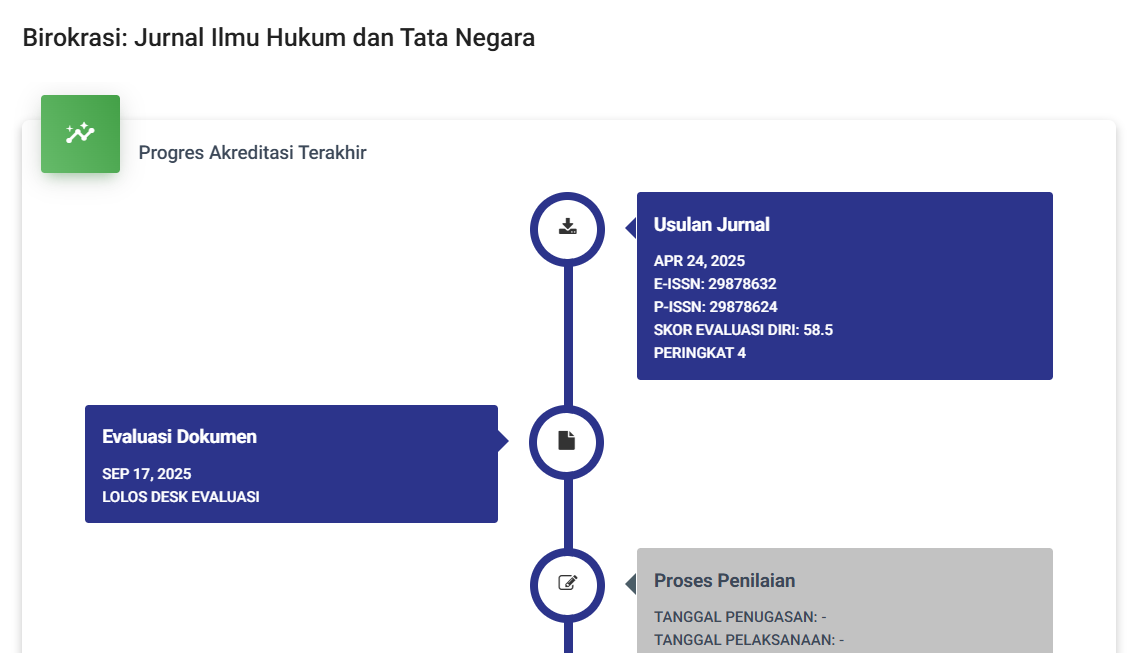Optimization Of Digital Villages In Public Services In The Era Of Technological Disruption Case Study Of Bergas Village, Semarang District, Central Java Province
DOI:
https://doi.org/10.55606/birokrasi.v1i4.866Keywords:
Digital Village Optimization, Public Services, Era of Technological DisruptionAbstract
The availability of information and easy access to information related to the village can provide opportunities for outsiders to get to know Bergas village, thus opening up opportunities for creating collaboration between the village and outside parties. One effort that can be made to provide access to information about villages is by digitalizing villages. Village digitalization is a priority program for the Ministry of Villages in 2021. Village digitalization can help prepare a database that is useful for planning, implementing, monitoring, and evaluating village development. Digitalization of villages in the era of disruption also supports the development of superior village potential through data collection and e-commerce, acceleration of village public services to the community, and financial transparency and village development activities. With village digitalization, it is hoped that it can raise the local potential of villages, especially the potential for tourism, MSMEs, and superior products, as well as the local food potential of Bergas village. This type of research is descriptive research. The approach used is a qualitative approach and a conceptual approach. The data source used is secondary data. Data analysis was carried out descriptively and qualitatively. Concluding is carried out using a deductive method from general to specific, especially those related to the research topic, namely Optimizing Digital Villages in Public Services in the Era of Technological Disruption. Case Study of Bergas Village, Semarang Regency, Central Java Province. This research produced findings. Creating a digital village itself has several conditions that must be met. Digital villages require the availability of adequate information and communication networks, whereas digital villages must have good communication networks because this is a factor that is used to use online-based systems. Second, to create a digital village, quite large funding is needed. Currently, digital villages are the result of collaboration between regional governments and the central government through the Communications and Information Telecommunication and Information Accessibility Agency (BAKTI) and other parties. Third, the availability of human resources (HR) who manage various online information technology-based services. The implementation of a digital village has a broad nature and concerns the interests of society, so it must be implemented in an integrated and directed manner by the government, business entities, and the community. The community has a very large role in implementing the undertaking of digital villages to realize equal distribution of welfare with the support of providing telecommunications and information infrastructure in the form of public services.
References
Zakaria, “Konsep Pengembangan Kawasan Desa Wisata di Desa Bandungan Kecamatan Pakong Kabupaten Pamekasan,” J. Din., vol. 07, pp. 12–17, 2014.
F. P. Simbolon and L. Yanti, “Customer Engagement in Higher Education: How Important the Role of Social Media Marketing, E-Service Quality and E-Satisfaction for Generation Z Students?,” The Winners, vol. 22, no. 1, pp. 15–23, 2021, doi: 10.21512/tw.v22i1.6970.
L. Y. Liu, “The Influence of Digital Marketing The Country of Origin Image, Service Quality and Product Involvement on Consumer Purchase Decisions : An Empirical Study of Insurance and Catering Services in Taiwan,” J. Consum. Mark., vol. 23, pp. 248–265, 2018.
Andriani, “Potensi Pengembangan Agrowisata Berbasis Komunitas Di Desa Cibodas Kecamatan Lembang Kabupaten Bandung Barat,” Jurna Manaj. Desa Maju, vol. 07, pp. 33–45, 2019.
H. Atmoko, “Strategi Pengembangan Potensi Desa Wisata Brajan Kabupaten Sleman”, dalam Jurnal Media Wisata,” J. Din. Manaj., vol. 13, pp. 23–27, 2018.
Sugiyono, Metode Penelitian Pendidikan Pendekatan Kuantitatif, 2nd ed. Bandung: Gramedia Pustaka Utama, 2013.
L. J. Moleong, Metodologi Penelitian Kualitatif, 7th ed. Bandung: PT. Remaja Rosdakarya, 2004.
Rohim, “Pemberdayaan Masyarakat Melalui Pengembangan Desa Wisata (Studi Di Desa Wisata Bejiharjo, Kecamatan Karanngmmojo, Kabupaten Gunungkidul, DIY,” Jurna Manaj. Desa Maju, vol. 07, pp. 13–15, 2020.
Martono, “Pemberdayaan Masyarakat Melalui Pengembanga Desa Wisata Dan Implikasinya Terhadap Ketahanan Sosial Udaya Wilayah ( Studi Di Desa Wisata Panglipuran Bali),” J. Huk. Bisnis, Yayasan Pengemb. Huk. Bisnis, vol. 01, p. 2014, 2016.
N. Kamariah, “Capacity Building : Birokrasi Pemerintah Daerah Kabupaten/Kota di Indonesia.,” Sekol. Tinggi Ilmu Adm. Adm. Negara (STIA LAN), vol. 02, pp. 55–60, 2012.
D. Ratnasari, “Pengembangan Kapasitas (Capacity Building) Kelembagaan Pada Badan Kepegawaian Daerah Kabupaten Jombang,” J. Adm. Publik, vol. 03, pp. 32–42, 2000.
Watkins, “Digital tourism as a key factor in the development of the economy,” Tour. Manag. Innov., vol. 22, pp. 18–23, 2021.
Kusuma, “Potensi Pengembangan Agrowisata Berbasis Komunitas Di Desa Cibodas Kecamatan Lembang Kabbupaten Bandung Barat,” J. Adm. Pubik, vol. 05, pp. 23–27, 2017.
K. Anggraini, “Pengembangan Kapasitas Pegawai Untuk Mewujudkan Good Governance Studi Pada Kantor Badan Kepegawaian Daerah Kabupaten Malang,” J. Adm. Publik, vol. 03, pp. 17–29, 2007.








